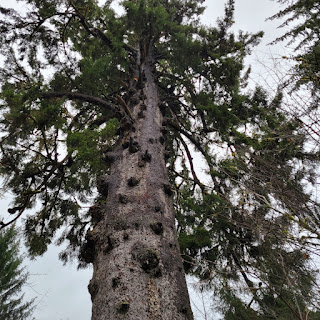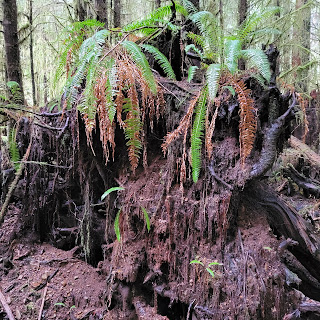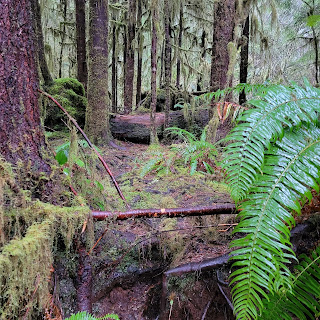Let me be clear: I believe city government has an essential role in making our city livable and workable for everyone. I believe taxes are the price we pay for living in a civilized society. I vote and speak out for the passage of measures to make Spokane a better place to live, such as Citizens for Spokane Schools and our “Yes for Kids” campaign every three years, the street bond that is improving the streets on which I commute via bike every day, and the sales tax that supports mental health services and law enforcement, among other things.
I’m not an anti-government, anti-tax conservative. I’m not opposed to the creation of government programs that address market failures—in fact, I believe that’s why we have governments, because markets so often fail to protect the environment or provide services for people who don’t have fat wallets or a working vehicle.
To make it even harder, I like and respect many of the people who are working with great passion for passage of Prop 4. I think the City Council's addition of advisory votes on funding if Prop 4 passes was an inappropriate effort to condition voter response to the measure, even though I agree with them that it creates unmanageable burdens on the City's budget. I am completely at odds with some of the people I find blogging against Prop 4, in disagreement with reasons they state against it, and in some cases downright alarmed by their overall political philosophies (I won't even link to the example I'm thinking of--he's seeing Communists behind every bush and doesn't deserve the traffic.)
But I oppose Spokane’s Prop 4. Not only do I oppose it, I’m allowing my name, face and words to be used in ads against it.
It would be easy not to—just to oppose it silently and vote no. Maybe tell a few friends who ask, but keep my head down so I don’t alienate anyone who might support me politically at some point if I ever run for office again (or lose a few friends on Facebook).
But I believe it’s important for people who share progressive values, and who have legitimate concerns about a specific proposal from “our own side,” to be willing to speak up. The left is not a monolith, nor is it a bunch of mindless sheep lined up and waiting to support the latest new government program. I think the criticisms of current national health care reforms prove that point nicely.
We have minds and we need to use them to analyze critically the proposals from our own—not just from the other side. Since the full text of the measure will not even appear on the ballot, it's particularly important for people to share their thoughts so voters might be encouraged to go read it for themselves before voting.
I’m not opposing Prop 4 because I think it’s great to let developers violate the comprehensive plan or because I think everything’s fine and needs no improvement—far from it. I think we need an impact fee ordinance that really encourages density and true transportation choice, for example. Hey, maybe the City Council could get on this—if we had the right people there.
I’m not opposing it because I disagree with every item on the list—there are some I support, had they been presented as separate items for individual votes in accordance with the state's requirement for single-subject measures to be presented to the voters.
I’m not opposing it just because I think specifying fee-for-service as the mechanism for preventive healthcare is the wrong way to go about getting that for every resident who needs it—although I do, and I really wonder at the choice of this particular mechanism.
I also wonder about declaring a right to healthcare services; only part of our health status is actually determined by access to healthcare services, preventive or not. They might have called on the city to do more to create an environment in which individuals can attain a better health status—something that’s actually doable within the core services a city delivers. A healthier city would expand its infrastructure, education and encouragement aimed at making it easier for more people to choose active transportation, for example, with related decreases in chronic preventable diseases such as obesity, diabetes and cardiovascular disease.
I’m opposing it because, as written:
It’s unenforceable. Some measures have specific mechanisms, others don’t, and some of the elements are simply illegal for a city government to undertake.
It’s a big fat target for lawyers who sue and then get paid (by us, the taxpayers) no matter what the ruling in the end. Insert loud cha-CHING sound here. If the city wins its side of the suit, though, we don’t get our attorney fees covered, so it’s written to encourage anyone, from anywhere, to file suit against the city. That’s us. (At least, that’s how I read their language, since it refers to the prevailing plaintiff getting attorney fees reimbursed, but not prevailing defendant.)
Oh, but it gets better: Those suits can be brought against any person for violating the terms of these amendments. Your potential liability isn’t just indirect, as a city taxpayer—it’s direct.
It seeks to regulate sectors such as lending institutions and health care that are regulated at the federal level and which city government can’t touch.
Let’s think about the lending provisions just a little more, shall we? Anyone recall a certain financial meltdown in oh, say, the last 18 months or so? Anyone think that lending institutions should have pretty high standards for the financial wherewithal of their borrowers to repay loans? Maybe this has something to do with our overall stability as an economy, which isn’t really in A+ shape right now?
Maybe we should ask lending institutions to be fair-but-tough on everyone they lend to, rather than seeking to extend extra consideration to a borrower based solely on ZIP code rather than on ability to repay. People and businesses in Spokane already have “equal access to capital” as called for in this: They have to prove they’re worth lending to. If that bank or credit union is the place where I’m keeping my money, given that I want it back, I probably support this standard. Some great micro-lending programs are out there that could be developed and applied here. Oh, and there’s the Community Reinvestment Act, too.
It includes a “right” to affordable and renewable energy, which is a service not even delivered by the city. No mechanism proposed so I don’t what you’d sue to have the city do here, but I’m sure there’s something.
It grants rights to ecosystems. Since the river can’t come into court and sue on its own behalf, someone will have to do that. Setting that aside, just look at the right it grants the ecosystem: The right to exist and flourish. How on earth—how on EARTH—does the city accomplish this? I feel pretty good about my credentials as an environmentalist, but I honestly don’t get this.
Despite the wording emphasis on our incredibly important and irreplaceable river and aquifer systems (a topic on which I’ve commented here and on the late lamented MetroSpokane blog), this describes not just the Spokane River Gorge, our sole-source aquifer, or a wetland that provides essential habitat—this includes every element of incredibly complex systems.
This goes so far beyond existing environmental protections at the local, state and national level that I can’t begin to imagine the range, complexity, and pettiness, let alone the expense, of the suits that will be brought. And since Nature really is “red in tooth and claw,” things are living and dying every day, in every ecosystem. Human action didn’t bring an end to the dinosaurs. “Right to exist and flourish” isn’t one of Nature’s principles—it’s a human idea.
Sarcasm alert: Why, only the other day I tore out some crappy little shrubs in my backyard because I want to plant raspberries so I can increase my food sustainability just a bit. Goodbye to a little bit of insect habitat in my backyard ecosystem (I don’t think the squirrels were getting any food off these particular bushes) and its right to exist and flourish.
I absolutely want access to undamaged ecosystems. I just don't think we get them by bogging down the court system.
It gives power to neighborhood councils that I can’t elect or un-elect. Not just the power to enforce the comp plan, as I’ve heard supporters say (and we do need better enforcement and real teeth for the comp plan). It gives them the power to veto anything that doesn’t square with the provisions of these charter amendments themselves. All of them.
More on this because I think this is the heart of the matter, thanks to the bad City Council decision for the Southgate Neighborhood and the expansion of unnecessary big-box development that just encourages the American addiction to unsustainable overconsumption. If we really want to protect ecosystems around us, one way we can help achieve that in this area is by increasing density and containing sprawl. Spokane covers more square miles with far less density than cities like Seattle, San Francisco or Paris, France.
If you increase density within the urban growth area, you’re going to have to—wait for it—build taller buildings, closer together. In someone’s neighborhood. Where they may like things just the way they are. So they’ll carry petitions, get signatures (not that many needed), and take it to the neighborhood council.
If Prop 4 passes, instead of increasing urban density you’ll encourage people to build outside the city of Spokane, where they’re free to destroy a little eco-space and won’t have to wait for a neighborhood council veto, and you’ll encourage sprawl. I’m 100+% certain this is not the goal of Prop 4 supporters. Unintended consequences, folks, unintended consequences—the problem with every well-intentioned law or regulation.
I served four years in the Idaho legislature and I’m pretty good at reading statutory language. One of my colleagues across the aisle, in fact, told me after I lost my reelection bid in 1994, “We’ll miss you. You used to read the bills.” (Not sure what that indicates about the other legislators—kinda scary.)
I’m not trained as an attorney, but writing legislation gives you some practice in paying attention to details and language. So I see the holes, I see the inconsistencies, and in particular I see the difference between what the charter actually says and what its supporters tell you it says.
I’ll take just one example—and a darned expensive one it is. In the Sunday Oct. 11 Spokesman-Review pro/con roundtable articles, Prop 4 backer Brad Read writes:
“(The opposition is)… working hard to convince voters that the proposition would require the city to buy health care for all residents, which couldn’t be further from the truth. By intentionally misrepresenting it, they’re avoiding the measure’s clear language, which merely requires the city to convene a meeting of health care providers to determine how their existing fee-for-service preventive programs can accommodate all Spokane residents who need such care.”
The proposition’s “clear language” does not “merely require the city to convene a meeting” no matter what someone asserts. The proposed charter amendment says this:
“Residents have the right to affordable preventive health care. For residents otherwise unable to access such care, the City shall guarantee such access by coordinating with area healthcare providers to create affordable fee-for-service programs within eighteen (18) months following adoption of this Charter provision.”
“The City shall guarantee such access.” Guarantee.
The language laid out in the clause that starts “by coordinating….” provides for a specific mechanism. But if that mechanism doesn’t work, the guarantee is still sitting there, and I doubt the city leaders would be allowed to shrug their shoulders sadly if a meeting didn’t lead to the intended outcome and just walk away.
This guaranteed access is the primary subject and object of that sentence. (I majored in English and Linguistics, which comes in handy when you’re parsing statute.) It’s the goal of Prop 4 supporters for people to get this access, not for the City to convene a meeting. It must be—otherwise why bother?
Furthermore, it doesn’t say providers, and providers only, will extend existing programs. It says the City will coordinate with those providers to create programs. The City is the one charged with guaranteeing this access, so it holds the responsibility for seeing that the programs are created regardless of cost required to make them “affordable” to residents.
Since these same providers suffer from lower Medicare/Medicaid reimbursement rates than other parts of the country, and everyone involved would have to find the money to pay the providers of preventive healthcare somehow, you tell me how this is accomplished without the City writing some mighty big checks drawn on taxpayer-funded accounts. (And someone, somewhere, funding and running the system that does the screening to figure out exactly which residents are “otherwise unable to access such care” and which ones aren’t, so you know who’s eligible for the care. This is a new definition with respect to eligibility for care, so it means extending the current system or creating a new one.)
If you edit the charter sentence down by removing the dependent clauses (except the time frame just so you can ponder the cost and complexity), it looks like this:
“…. The City shall guarantee such access … within eighteen (18) months following adoption of this Charter provision.”
This one strikes close to home because when I served in the Idaho Senate, I sponsored legislation seeking to bring together a widely representative group of stakeholders—people with disabilities and mental health issues who aren’t well served under current systems, primary care providers, seniors, hospitals, insurers and others—to design a health care reform effort that would work for us in hopes of getting a Medicaid waiver and trying something new. Couldn’t get it out of committee, it being Idaho and all, and I took plenty of flack from lobbyists for even trying.
This isn’t just a requirement to convene a meeting. It really isn’t. I sit now on the board of a healthcare foundation (which is not in any way associated with my political views, so I won’t name it here.) I can assure you of my commitment to making affordable preventive healthcare available to everyone. Having the city convene a meeting is not going to accomplish this, and for a supporter to say the charter amendment “merely requires the city to convene a meeting” appears to be a misunderstanding of their own mandate for a right to be guaranteed by the City.
This piece has now officially crossed the line from discourse to diatribe to rant, which isn’t where I wanted to go.
One more thing before we break up this lovefest, just because I’m a big fan of representative democracy in all its messiness and incomplete realization of its highest goals--
Supporters make it sound as if these are the rights we need to protect us from business as usual, and that with their adoption things will finally start happening around here that will contribute to a more sustainable, more livable community. Since we’re still working on fully realizing the values of equality embodied in the U.S. Constitution more than 200 years after its adoption, I’m pretty sure that’s not the case.
Yet every week issues come before the City Council that affect our ability to live according to values found in Prop 4.
- How they will ever pay for street repair—that’s a biggie for me, since I’m (ahem) rather intimately acquainted with our rough streets as a bike commuter, and complete, well-maintained streets are essential for bike commuting and access to transit stops.
- How they’re going to balance the budget in the face of falling revenues and rising healthcare costs.
- How the City’s own practices as a purchaser of goods and services, a real estate/facilities manager, and employer could become more sustainable.
- How we might improve our courts and law enforcement practices so people with mental disabilities get appropriate responses and the treatment they need.
- Whether or not to vacate a particular street right-of-way, affecting future opportunities to add bike lanes or rapid transit and the texture of our urban fabric when smaller blocks are consolidated into larger ones.
The answers to these will not be provided by passage of Prop 4. The votes that will affect the outcomes of specific issues requiring specific budgets will be taken by members of the City Council. We will still have representative democracy and we will still need good City Council members.
Prop 4 has ended up being used as a deadweight wrapped around the necks of two good candidates despite their stated opposition to it. Specious analysis of campaign contributions is being used to imply hidden support, without regard for the ability of reasonable people to agree on some things and disagree on others. (For a nice discussion see Spokane Skeptic and DTE Spokane.)
If those candidates lose, Prop 4 supporters have something to answer for every week when the City Council votes.

















